竹子机经 5.23版 6.12.13 口语与写作2 免费
- 格式:pdf
- 大小:6.42 MB
- 文档页数:31
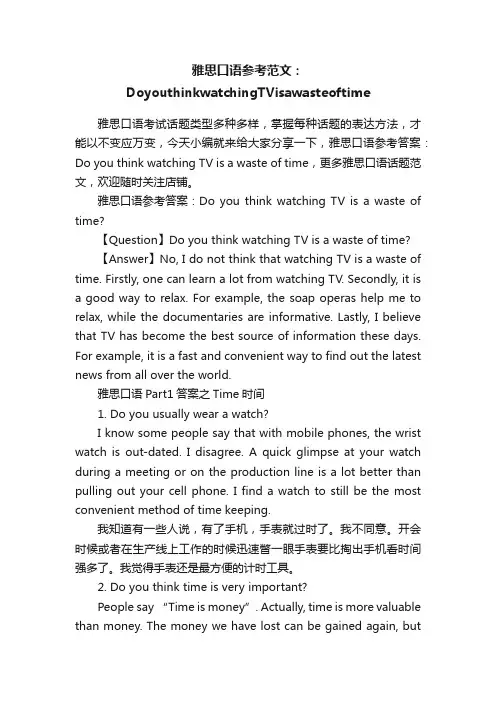
雅思口语参考范文:DoyouthinkwatchingTVisawasteoftime雅思口语考试话题类型多种多样,掌握每种话题的表达方法,才能以不变应万变,今天小编就来给大家分享一下,雅思口语参考答案:Do you think watching TV is a waste of time,更多雅思口语话题范文,欢迎随时关注店铺。
雅思口语参考答案:Do you think watching TV is a waste of time?【Question】Do you think watching TV is a waste of time?【Answer】No, I do not think that watching TV is a waste of time. Firstly, one can learn a lot from watching TV. Secondly, it is a good way to relax. For example, the soap operas help me to relax, while the documentaries are informative. Lastly, I believe that TV has become the best source of information these days. For example, it is a fast and convenient way to find out the latest news from all over the world.雅思口语Part1答案之Time时间1. Do you usually wear a watch?I know some people say that with mobile phones, the wrist watch is out-dated. I disagree. A quick glimpse at your watch during a meeting or on the production line is a lot better than pulling out your cell phone. I find a watch to still be the most convenient method of time keeping.我知道有一些人说,有了手机,手表就过时了。
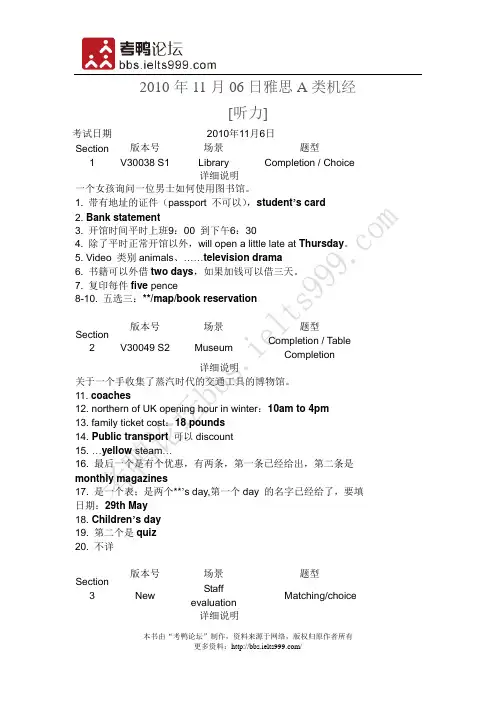
2010年11月06日雅思A类机经[听力]考试日期2010年11月6日Section1版本号场景题型V30038 S1Library Completion / Choice详细说明一个女孩询问一位男士如何使用图书馆。
1. 带有地址的证件(passport 不可以),student’s card2. Bank statement3. 开馆时间平时上班9:00 到下午6:304. 除了平时正常开馆以外,will open a little late at Thursday。
5. Video 类别animals、……television drama6. 书籍可以外借two days,如果加钱可以借三天。
7. 复印每件five pence8-10. 五选三:**/map/book reservationSection2版本号场景题型V30049 S2MuseumCompletion / TableCompletion详细说明关于一个手收集了蒸汽时代的交通工具的博物馆。
11. coaches12. northern of UK opening hour in winter:10am to 4pm13. family ticket cost:18 pounds14. Public transport可以discount15. …yellow steam…16. 最后一个是有个优惠,有两条,第一条已经给出,第二条是monthly magazines17. 是一个表;是两个**’s day,第一个day 的名字已经给了,要填日期:29th May18. Children’s day19.第二个是quiz20. 不详Section3版本号场景题型NewStaffevaluationMatching/choice详细说明21-26 配对(较难)A. FrustratedB. challengingC. enjoyableD. easy21. 住宿D22. tour到周围观光D23. leisure activities C24. 吃的B25. 不详B26. information technology problem A27-30 多选(仅供参考)27-28 老板觉得ALEX有什么好的?brilliant,提过一些建议29-30 ALEX觉得自己有什么改进的地方?plan Telephone calls,deadline等Section4版本号场景题型New Agriculture Completion详细说明31. 研究fruit growing 对环境和什么的影响32. 关于营养和water33. 在一个什么land和woodland34. 用comparison的方法比较两个不同的什么35. 在当地的一个river附近研究36. record37. 用microscope38. 和specialized software39. 研究(今年是)butterflies40. location综合点评两新两旧,难度适中[口语]考试日期:2010.11.06Part 1Your Work or Your StudiesWhat do you do (in a typical day) at work?Do you like your job?Would you like to change your job?Do you think you will need to receive any training in the future?What job would you like to do in the future?Why are you taking the IELTS test?Do you think the first day at work is important?What subjects are you studying?Why did you choose that subject?What school (or university) do you go to?Why did you choose that university (or, school)?How do you like your subject?What's your favourite subject at school?What's the most difficult part of your course?What's the most interesting part of your course (your subject)? For you, what's the most interesting part (or subject or class) of your course?Do you think it will be easy to find that kind of work?Did you like your first day at university?Do you think the first day at university is important?Your Home& Your AccommodationDo you live in a house or a flat?How long have you lived there?Do you plan to live there for a long time?Please describe your home a little.What are the benefits (or, advantages) of living in a flat/house? What's your favourite room in your home? (Why?)How do you think your home (your house or your flat) could be improved?What is the environment like around your flat/house?Is it easy to travel to and from your home?Would you say it's a good place to live?Where do you come from?Where do you live at the moment?Does your whole family live there?Tell me something about your hometown.What would you recommend a tourist see in your hometown? Do you prefer to live in a big city or in the countryside?Would you say it's a good place to grow up?Would you say that's a good place to live?Do you plan to live there/here for a long time?What (other) city would you like to live in (in the future)? What's the traffic situation like in your hometown (or, whereyou are living now)?CollectingDo you collect anything as a hobby?Did you collect anything (such as stamps or CD's) when you were a child?Do you still collect them now?Why do you like collecting things?If you had a lot of money, what would you like to collect?TravellingHave you ever been on a long trip? (If yes, say where you went!)Do you like travelling? Why?Which country would you like to travel to (in the future)?WeatherWhat's the weather (usually) like in your hometown?What changes are there between the different seasons in your country?What's your favourite season? (Why?)Do you usually pay attention to the weather forecasts?Does the weather ever affect what you do?Do you (or, do people in China) do the same things in the different seasons of the year?ShoppingDo you like shopping? CDo you prefer shopping alone or with others?What time of the day do you prefer to go shopping?When was the last time you went shopping? CDo you prefer to buy things in small shops or in big shops such as supermarkets and department stores?Is there anything you dislike about shopping?Mobile PhonesDo you have a mobile phone?What do you use it for?How often do you use it?When did you get it?How did you feel when you got your first mobile phone?What feature (or, function) of your cell phone do you like the best?Is there anything you dislike about using cell phones?CookingDo you like cooking?Who usually does the cooking in your family (or, in your home)?When did you learn how to cook?In the future, do you think you will be cooking more than you do now, or less? (Why?)SoundsDo you prefer a quiet environment or an environment with some sounds?What natural sound do you like the most?What sounds do you dislike?What sounds remind you of your childhood?Clothes and FashionDo you like shopping for clothes?Are you very interested in fashion (or, clothes fashions)?Do many people (in China) follow fashion?AnimalsDo you like animals?What's your favourite animal?Are people in your country fond of animals?Do you think cities are suitable places for keeping a pet?ColoursWhat's your favorite color?Do you usually wear clothes in your favourite colour?Are there any colours that have a special meaning in your country?What colour would you choose to paint the walls of your room?SportAre you interested in sport?What sports do you like?Do most people in your country like sport?What benefits do you think sport can bring us?Do (did) you often play sport at school? (What sport?)Do you think it's important for children to play sports?Part 2&3PlaceDescribe a place you have visited(want to visit)Why many people want to live in this place?There’s many problem in transportation in this place?So why many people still wants to live in this place?How this place affects people?Why people like to live in the city?Describe a place you visited where you learnedsomethingWhy do people build museums?What are they used for?Why don't some people want to visit museums?Describe a place you go to that has a lot of noise.What noises can we hear in a city?Do you think noise (ever) has any benefits?Do you think noise can be considered to be a form ofpollution?What harm can noise do to people's health?How do you suggest this noise could be controlled?What do you think the government should do about excessivenoise?Object/ ThingDescribe a sport you would like to be good atDo you think sport are necessary at school?What do you think are the benefits of international sportingcompetitions?Why do you think athletes from certain countries are better atsome sports than athletes from other countries?Describe a type of music that is popular in your country.What is the importance of music in people's lives?How do people's preferences in music change with age?Describe a useful piece of (electrical) equipment that youoften use at homeAre there any of those that you think are not very important? What do you think are the benefits of using modern equipment and devices (in the home)?Do you agree that older people have difficulties in using modern equipment?How can we help elderly people to use these modern devices? Describe a hobby you had when you were a child.What hobbies do young people in your country have?What hobbies for children do you think will be most useful for them when they grow up?describe a favourite subject in high school or secondary schoolDo you want to study this subject in the future?what is the popular subject in high school, whywhat is the interesting subjecthow can teacher make class interestingtechnologies and high school student's study.Describe something healthy you would recommendWhat do you think are the differences between healthy food and 'junk food'?What things do you think people in China need to do in order to improve their health?Do you think modern people do enough regular exercise?Do you think it's important for children to learn about a healthy lifestyle?Do you think the media can play a role in educating people about health?Do you think it's a good idea for employers to encourage their employees to live a healthy life?How can employers do that?Describe a film you have recently seen.What kind of movie is popular in China? Why?What is the difference between Chinese movie and foreign movies?What do you learn from watching movies?Do you think it is important for a movie to be advertised?If foreign movies without advertisement, will it still be so success?Do you think a movie will be success without advertisement? If yes, why?What kind of people prefer to watch foreign movies than Chinese Movies in China? Why?What is the difference between Chinese and Foreign movies?Describe an interesting wild animal from your country What kind of relationship do people and animal have?What is the difference between having a pet now and having a pet in the past?Is it better to have a dog in city or rural area?Is vegetarian conducive to protect animals?Do you think animals should be killed? Why?Why do people raise pets?What are the advantages and disadvantages of raising pets? Why is it popular to raise pets?What can we use animals for?Are you a vegetarian?Should animals be kept in cities or countryside?What are some of the problems related to raising pets? Describe something you made yourself (either alone or with othersIn China, do many people make things themselves?What are some reasons why (some) people make things themselves?In order to make something, what qualities does a person need to have?Which group is better at making things by hand, men or women?What are some differences between hand-made things and things made by machine?Do you think there are any differences concerning the quality of hand-made and factory-made products?Describe an interesting job you have heard about or read about.Do you think it's reasonable (or, fair) that people have different salary levels?What do you think of the working conditions in your country at the moment?Do you think most people's working conditions in your country are better than in the past?Do you think working conditions will improve in the future?In what ways do you think working conditions still need to be improved?What minimum working conditions should all employees be given, by law?What effects does (or can ) working overtime have on the lives of employees, especially women?Describe an advertisement that you think is successful. You should say:What is advertised?What the advertisement contains (the contents of this advertisement)What is the function (purpose) of this advertisement?What kinds of people would be (or, are) interested in (or attracted to) this advertisementAnd explain why you this advertisement works well.Describe an exciting message.Was it from phone or emailWhat was it aboutWhat did you do after you received itHow are younger people and older people different in receiving messages?Is it easy to talk to the elderly?Is it easy to communicate with teachers?Do teachers need communication skills?Describe a gift you want to send to somebody.Who will you send this giftWhyHow do you think the receiver would respondWhat do you think of gift-givingWhat do you think of donating to charity?What is the significance in donation?How would the trend of donation be?Describe a law.Is it difficult to become a policeman?Should policemen bear guns?Are men more suitable to become police than women?Are lawyers respected?What makes a good lawyer?When do people need laws?EventDescribe some situation that some people gave u some useful advicewho gave u the advice; When; what happenedDo you always take your parents advice? what advices?Do you like to take their advice? Why/why not?Do you think young people should follow the advice from friends or parents?Why do you think we should follow advice from parents?Describe a naughty thing you did in your childhood.what you didwhy you did itand explain how your parents felt about what you did.or and explain the results of what you did.What are the differences between the things done by children and adults?Do children always follow adults' instruction?When are children thought to be grown-ups?Do you think it right to assume that an 18-year-old is an adult?Describe some recent changes to your hometown.What are some differences between young people in the past and at present?Among people, what differences in attitudes are there about change?What kinds of people like change and what kinds of people dislike change?When governments make changes to society, who usually benefits the most?Describe a long journey that you have been on.What are the different forms of transport that people use for long journeys?How can (or, could) (long distance) transportation be improved?Describe an important celebration in your culture.You should say:when this celebration is heldwhat people do during this celebrationand explain what you like or dislike about this celebration .PersonDescribe a TV or radio presenterWhat skills does a person need to be a TV or radio presenter? What are some differences between a radio presenter and a TV presenter?Describe a friend you admire.What kinds of people do young people (teenagers or children) admire?Describe a famous artist you admireDo you think art (or, the arts) is (are) important?How has art changed (in China) in the past few years (or, decades)?How important do you think it is for children to have art classes in school?What are some good ways to teach art to children?Do you think art and literature (or, the arts) should be taught in universities?Describe a family (not your own) you enjoyed spending time with.Can you think of any activities that younger family members and older family members (usually/often/sometimes) do together?Describe an elder person you know and admireDo people like to be old?Do elder people need to be educated?Is there any lesson for elder people?Describe a famous foreign person you would like to meet Why would people want to be famous?How does fame influence them?How would they change after being famous?Describe a person who helped you on an important occasionWhat are the advantages and disadvantages of a strong familyrelationship?Describe a person who speaks different language fromyou.Describe a teacher you had when you were a child andwho you likedWhat makes a good teacher?What are the benefits of becoming a teacher?People say teachers are no longer a desirable job. Do youthink so?Should government encourage the intelligent people tobecome teachers? Why?How do you encourage people to become teachers?Do many young people in your country want to teachers?What would cause more people to want to be teachers?What do you think is the most important quality that a goodteacher should have?Do you think there are any differences between male andfemale teachers?Do you think it's possible for school students to becomefriends with (their) teachers?[阅读]考试日期2010.11.06Reading Passage 1Title:关于水的工程Questiontypes:简答short-answer questions; 判断True/False/Not Given大致内容是说一个村子缺水,然后大家在缺水的时候要去一个什么地方来获得额外的收入(这里后面有个问答题考的),村子里的主要水资源是靠三个井(后面有问答题),然后在1985年的时候(也是问答题考的),村子向一个组织寻求帮助,这个组织好像是用一些管道去收集屋顶的水,然后收集到一个tank里面。
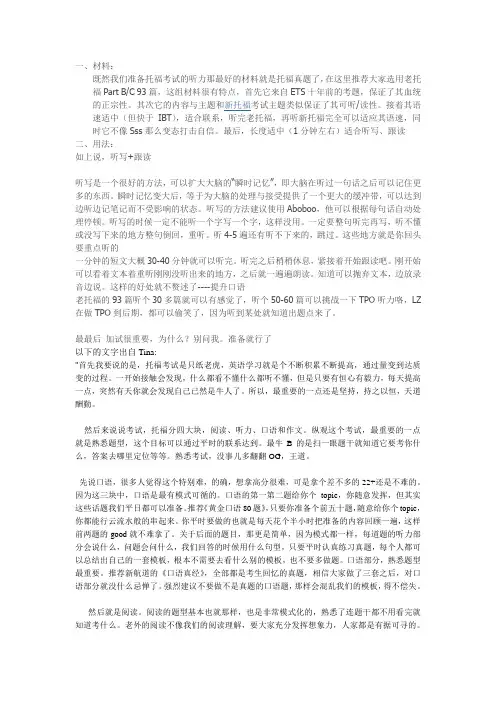
一、材料:既然我们准备托福考试的听力那最好的材料就是托福真题了,在这里推荐大家选用老托福Part B/C 93篇,这组材料很有特点,首先它来自ETS十年前的考题,保证了其血统的正宗性。
其次它的内容与主题和新托福考试主题类似保证了其可听/读性。
接着其语速适中(但快于IBT),适合联系,听完老托福,再听新托福完全可以适应其语速,同时它不像Sss那么变态打击自信。
最后,长度适中(1分钟左右)适合听写、跟读二、用法:如上说,听写+跟读听写是一个很好的方法,可以扩大大脑的“瞬时记忆”,即大脑在听过一句话之后可以记住更多的东西。
瞬时记忆变大后,等于为大脑的处理与接受提供了一个更大的缓冲带,可以达到边听边记笔记而不受影响的状态。
听写的方法建议使用Aboboo,他可以根据每句话自动处理停顿。
听写的时候一定不能听一个字写一个字,这样没用。
一定要整句听完再写,听不懂或没写下来的地方整句倒回,重听。
听4-5遍还有听不下来的,跳过。
这些地方就是你回头要重点听的一分钟的短文大概30-40分钟就可以听完。
听完之后稍稍休息,紧接着开始跟读吧。
刚开始可以看着文本着重听刚刚没听出来的地方,之后就一遍遍朗读。
知道可以抛弃文本,边放录音边说。
这样的好处就不赘述了----提升口语老托福的93篇听个30多篇就可以有感觉了,听个50-60篇可以挑战一下TPO听力咯,LZ 在做TPO到后期,都可以偷笑了,因为听到某处就知道出题点来了。
最最后加试很重要,为什么?别问我。
准备就行了以下的文字出自Tina:"首先我要说的是,托福考试是只纸老虎,英语学习就是个不断积累不断提高,通过量变到达质变的过程。
一开始接触会发现,什么都看不懂什么都听不懂,但是只要有恒心有毅力,每天提高一点,突然有天你就会发现自己已然是牛人了。
所以,最重要的一点还是坚持,持之以恒,天道酬勤。
然后来说说考试,托福分四大块,阅读、听力、口语和作文。
纵观这个考试,最重要的一点就是熟悉题型,这个目标可以通过平时的联系达到。
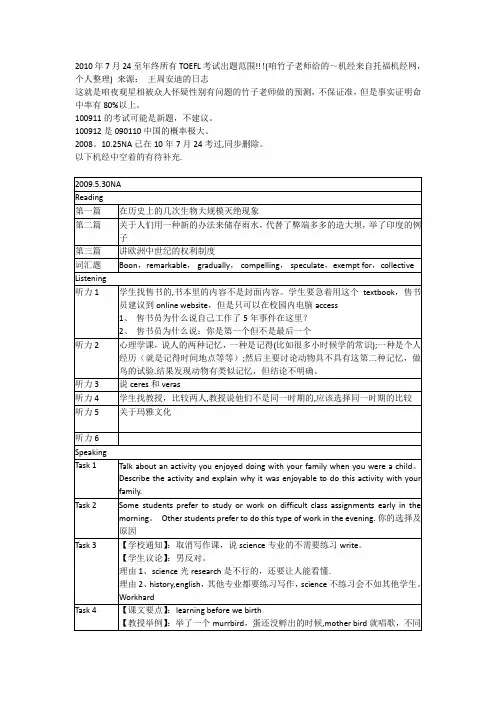
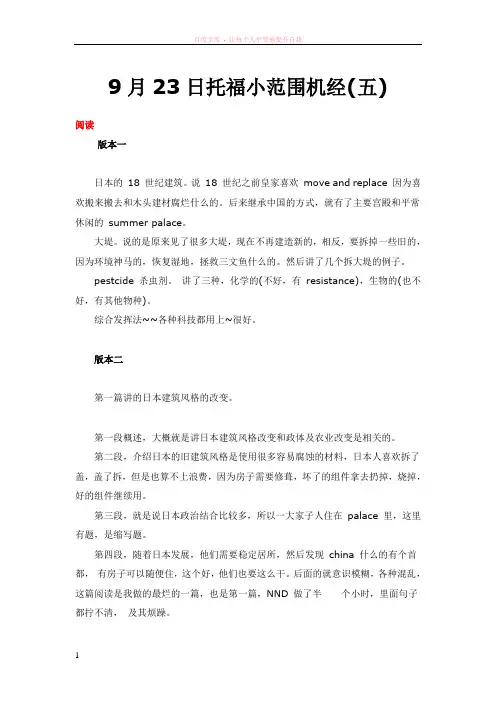
9月23日托福小范围机经(五)阅读版本一日本的18 世纪建筑。
说18 世纪之前皇家喜欢move and replace 因为喜欢搬来搬去和木头建材腐烂什么的。
后来继承中国的方式,就有了主要宫殿和平常休闲的summer palace。
大堤。
说的是原来见了很多大堤,现在不再建造新的,相反,要拆掉一些旧的,因为环境神马的,恢复湿地,拯救三文鱼什么的。
然后讲了几个拆大堤的例子。
pestcide 杀虫剂。
讲了三种,化学的(不好,有resistance),生物的(也不好,有其他物种)。
综合发挥法~~各种科技都用上~很好。
版本二第一篇讲的日本建筑风格的改变。
第一段概述,大概就是讲日本建筑风格改变和政体及农业改变是相关的。
第二段,介绍日本的旧建筑风格是使用很多容易腐蚀的材料,日本人喜欢拆了盖,盖了拆,但是也算不上浪费,因为房子需要修葺,坏了的组件拿去扔掉,烧掉,好的组件继续用。
第三段,就是说日本政治结合比较多,所以一大家子人住在palace 里,这里有题,是缩写题。
第四段,随着日本发展,他们需要稳定居所,然后发现china 什么的有个首都,有房子可以随便住,这个好,他们也要这么干。
后面的就意识模糊,各种混乱,这篇阅读是我做的最烂的一篇,也是第一篇,NND 做了半个小时,里面句子都拧不清,及其烦躁。
第二篇是说大坝的。
以前认为建大坝好,能发电各种好,现在风向转了,大家觉得建大坝对生态环境有影响。
这里好像问了个问题,为啥政府不建大坝了,答案应该是public 反对。
然后说现在政府不建大项目了(有题,好像我选的是IMPLY 小项目还是能建的),举了一种鱼samon 做例子,大坝建了以后这种鱼不能在自己的地方spawn 了,所以鱼濒危了。
下面一段不太记得了,好像又举了一种鱼,说是这种鱼即使把大坝remove 了还是濒危,因为这个鱼产卵的地方现在有好多clay ,政府如果想让鱼活过来,还要花钱去清理这个好多clay 的地方。
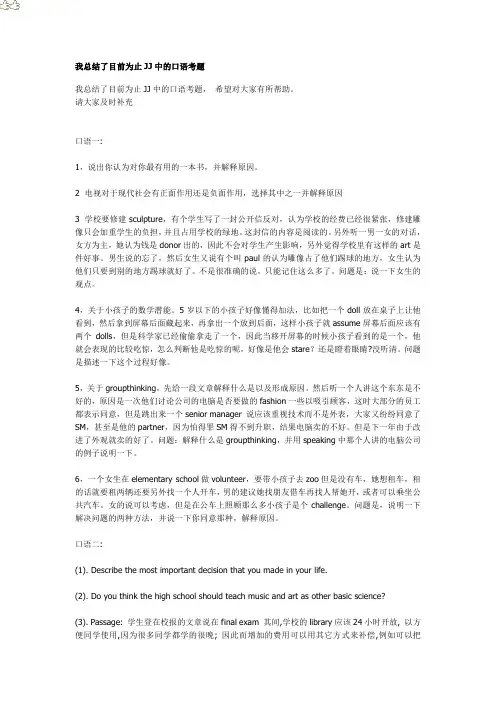
我总结了目前为止JJ中的口语考题我总结了目前为止JJ中的口语考题,希望对大家有所帮助。
请大家及时补充口语一:1,说出你认为对你最有用的一本书,并解释原因。
2 电视对于现代社会有正面作用还是负面作用,选择其中之一并解释原因3 学校要修建sculpture,有个学生写了一封公开信反对,认为学校的经费已经很紧张,修建雕像只会加重学生的负担,并且占用学校的绿地。
这封信的内容是阅读的。
另外听一男一女的对话,女方为主,她认为钱是donor出的,因此不会对学生产生影响,另外觉得学校里有这样的art是件好事。
男生说的忘了,然后女生又说有个叫paul的认为雕像占了他们踢球的地方,女生认为他们只要到别的地方踢球就好了。
不是很准确的说,只能记住这么多了。
问题是:说一下女生的观点。
4,关于小孩子的数学潜能。
5岁以下的小孩子好像懂得加法,比如把一个doll放在桌子上让他看到,然后拿到屏幕后面藏起来,再拿出一个放到后面,这样小孩子就assume屏幕后面应该有两个dolls,但是科学家已经偷偷拿走了一个,因此当移开屏幕的时候小孩子看到的是一个,他就会表现的比较吃惊,怎么判断他是吃惊的呢,好像是他会stare?还是瞪着眼睛?没听清。
问题是描述一下这个过程好像。
5,关于groupthinking,先给一段文章解释什么是以及形成原因。
然后听一个人讲这个东东是不好的,原因是一次他们讨论公司的电脑是否要做的fashion一些以吸引顾客,这时大部分的员工都表示同意,但是跳出来一个senior manager 说应该重视技术而不是外表,大家又纷纷同意了SM,甚至是他的partner,因为怕得罪SM得不到升职,结果电脑卖的不好。
但是下一年由于改进了外观就卖的好了。
问题:解释什么是groupthinking,并用speaking中那个人讲的电脑公司的例子说明一下。
6,一个女生在elementary school做volunteer,要带小孩子去zoo但是没有车,她想租车,租的话就要租两辆还要另外找一个人开车,男的建议她找朋友借车再找人帮她开,或者可以乘坐公共汽车。
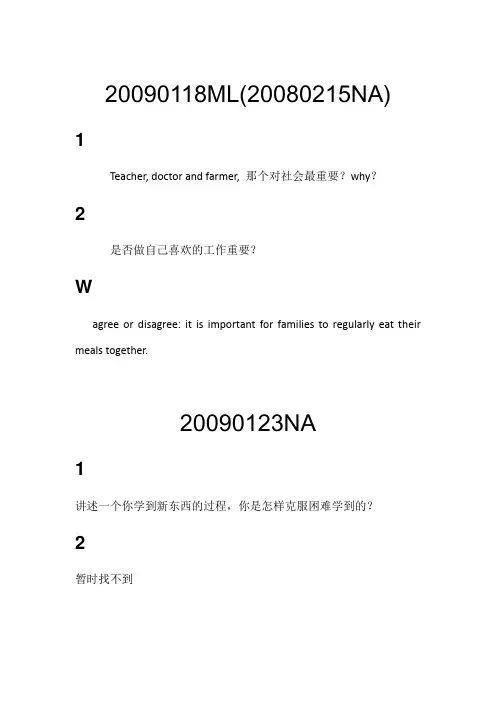
20090118ML(20080215NA)1Teacher, doctor and farmer, 那个对社会最重要?why?2是否做自己喜欢的工作重要?Wagree or disagree: it is important for families to regularly eat their meals together.20090123NA1讲述一个你学到新东西的过程,你是怎样克服困难学到的?2暂时找不到WDo you think that young people should take several different kinds of job beforethey take a career in a long term?20090214ML(20090214NA)1描述学生需要掌握的一个技能。
2buing item on internet, magazine 还是shopping at store?W同意与否:多种渠道知道信息是不是能让人们更加well-informed?20090221NA1what do you think is the most important quality of a working environment: good leaders, goodcolleagues, or flexible time?2Agree or disagree: cell phone changes our lives greatly.Wdo you agree or disagree Newspapers and magazines are the best way of learning about aforeign country.20090222ML(20071005NA)1描述在一段时间,你朋友让你惊奇的事情。
2假期里,你喜欢做室外活动还是室内活动?W你认为电视的作用应该在于教育还是在于娱乐。
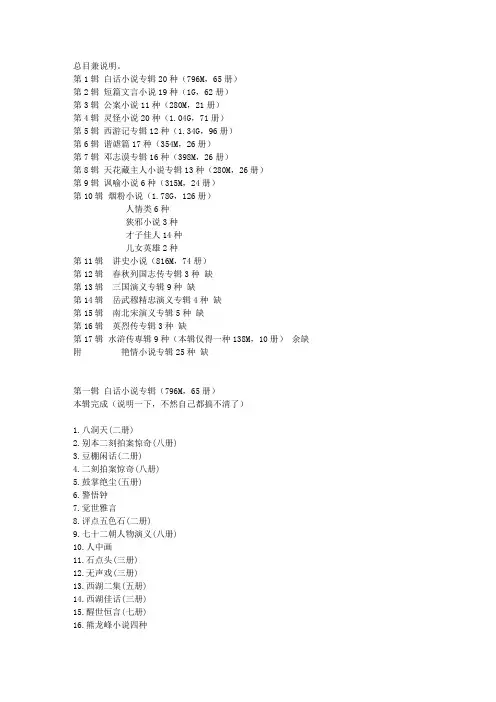
总目兼说明。
第1辑白话小说专辑20种(796M,65册)第2辑短篇文言小说19种(1G,62册)第3辑公案小说11种(280M,21册)第4辑灵怪小说20种(1.04G,71册)第5辑西游记专辑12种(1.34G,96册)第6辑谐谑篇17种(354M,26册)第7辑邓志谟专辑16种(398M,26册)第8辑天花藏主人小说专辑13种(280M,26册)第9辑讽喻小说6种(315M,24册)第10辑烟粉小说(1.78G,126册)人情类6种狭邪小说3种才子佳人14种儿女英雄2种第11辑讲史小说(816M,74册)第12辑春秋列国志传专辑3种缺第13辑三国演义专辑9种缺第14辑岳武穆精忠演义专辑4种缺第15辑南北宋演义专辑5种缺第16辑英烈传专辑3种缺第17辑水浒传専辑9种(本辑仅得一种138M,10册)余缺附艳情小说专辑25种缺第一辑白话小说专辑(796M,65册)本辑完成(说明一下,不然自己都搞不清了)1.八洞天(二册)2.别本二刻拍案惊奇(八册)3.豆棚闲话(二册)4.二刻拍案惊奇(八册)5.鼓掌绝尘(五册)6.警悟钟7.觉世雅言8.评点五色石(二册)9.七十二朝人物演义(八册)10.人中画11.石点头(三册)12.无声戏(三册)13.西湖二集(五册)14.西湖佳话(三册)15.醒世恒言(七册)16.熊龙峰小说四种17.再团圆18.照世杯19.醉醒石(三册)20.钱塘湖隐济颠禅师语录第2辑短篇文言小说(1G,62册)本辑完成1.广艳异编(六册)2.国色天香(三册)3.花阵绮言(三册)4.绿窗女史(七册)5.觅灯因话6.奇女子传(二册)7.情史类略(十二册)8.全像新镌一见赏心篇(二册)9.新镌全像评释古今清谈万选(二册)10.绣谷春容(四册)11.艳异编1(三册)12.艳异编2(七册)13.重刻增补燕居笔记1(二册)14.重刻增补燕居笔记2(三册)15.剪灯新话16.剪灯新话句解17.剪灯余话18.效颦集19.游仙窟第3辑公案小说(280M,21册)上传完成1.杜骗新书(二册)2.郭青螺六省听讼录新民公案(二册)3.皇明诸司公案(二册)4.廉明奇判公案传5.律条公案(二册)6.明镜公案7.全补包龙图判百家公案(二册)8.详情公案9.新镌绣像善本龙图公案(三册)10.新刻全像海刚峰峯先生居官公案(二册)11.新评龙图神断公案(三册)第4辑灵怪小说(1.04G,71册)上传完成1.北游记玄帝出身传2.草木春秋演义(二册)3.达摩出身传灯传4.二十四尊得道罗汉传5.飞跎全传6.封神真形图7.归莲梦(三册)8.韩湘子全传(三册)9.华光天王南游10.雷峰塔奇传11.绿野仙踪(十册)12.南海观世音菩萨出身修行传13.三宝太监西洋记通俗演义1(十册)14.三宝太监西洋记通俗演义2(十册)15.三遂平妖传(二册)16.唐钟馗全传17.新刊八仙出处东游记18.新刻钟伯敬先生批评封神演义(十册)19.新平妖传(五册)20.蟫史(六册)第五辑西游记专辑本辑完成01新刻出像官本大字西游记二十卷明吴承恩撰景华阳洞天主人校金陵世德堂刊本02鼎镌京本全像西游记二十卷明吴承恩撰景华阳洞天主人校闽书林杨民斋刊本03唐僧西游记二十卷明吴承恩撰景华阳洞天主人校刊本(缺22—25回)04西游记一百回图一卷即李卓吾先生批评西游记吴承恩撰景李氏评刊本05新锲三藏出身全传四卷明阳至和撰景刊本06鼎卷全像唐三藏西游释厄传明朱鼎臣撰景刊本07绣像古本西游记证道书一百回明吴承恩撰景西陵汪氏蜩寄刊本08西游真诠十卷清陈士斌撰景刊本09西游原旨一百回清刘一明撰景护国庵刊本10新刻批评绣像后西游记四十回清阙名撰景刊本11新说西游记一百回首一卷清张书绅撰景乾隆十三年(戊辰)自序刊本12通易西游正旨十卷清阙名撰景刊本(缺卷首1—10回、90—100回)第6辑谐谑篇(354M,26册)本辑完成1.东坡先生艾子杂说2.广谐史(四册)3.开卷一笑(三册)4.李卓吾先生评点四书笑5.山中一夕话(三册)6.听子7.笑得好8.笑府(二册)9.笑海丛珠醉翁滑稽樽俎笑苑千金东坡居士佛印禅师语录问答(合一册)10.笑林评(二册)11.谐铎(二册)12.新订解人颐广集(二册)13.新镌笑林广记14.雪涛谐史15.雅笑篇第7辑邓志谟专辑(398M,26册)本辑完成1.梅雪争奇2.飞剑记3.丰韵情书(二册)4.风月争奇5.花鸟争奇6.精选故事黄眉(三册)7.丽藻(二册)8.锲注释得愚集(二册)9.山水争奇10.蔬果争奇11.铁树记12.童婉争奇13.新刻洒洒篇(二册)14.新刻一札三奇(三册)15.重刻增补故事白眉(三册)16.咒枣记第8辑天花藏主人小说专辑(280M,26册)本辑完成1.定情人(二册)2.飞花咏(二册)3.画图缘小传(三册)4.幻中真(二册)5.金云翘传6.梁武帝西来演义(五册)7.两交婚小传(二册)8.麟儿报9.人间乐10.赛红丝(二册)11.玉娇梨(三册)12.玉支玑13.醉菩提传第9辑讽喻小说(315M,24册)本辑完成1.常言道(二册)2.醋葫芦(三册)3.疗妒缘4.儒林外史(七册)5.儒林外史评6.醒世姻缘传(十册)第10辑烟粉小说(1.78G,126册)本辑完成1.风月梦(二册)2.好逑传3.合锦回文传(四册)4.红楼梦补(四册)5.后红楼梦(五册)6.花月痕(五册)7.金石缘(三册)8.快心编(七册)9.林兰香(八册)10.岭南逸史(五册)11.妙复轩评石头记(十六册)12.品花宝鉴(十册)13.三分梦全传(三册)14.水石缘(二册)15.吴江雪(二册)16.五凤吟17.新镌古本批评三世报隔帘花影(四册)18.新刻绣像批评原本金瓶梅(八册)19.醒风流奇传(二册)20.雪月梅(六册)21.野叟曝言(二十册)22.引凤箫23.鸳鸯媒24.忠烈全传(四册)25.驻春园小史(二册)第11辑讲史小说(816M,74册)上传完成1.按鉴编纂开辟衍绎通俗志传(三册)2.按鉴演义帝王御世有夏志传(二册)3.残唐五代史演义传(二册)4.承运传5.飞龙全传(八册)6.后七国乐田演义7.皇明中兴圣烈传(二册)8.剑啸阁批评秘本出像隋史遗文(五册)9.近报业谭平虏传10.辽海丹忠录(四册)11.女仙外史(十册)12.盘古至唐虞传13.隋炀帝艳史(七册)14.孙庞斗志演义(三册)15.唐书志传通俗演义(四册)16.梼杌闲评(六册)17.新刻剑啸阁批评东西汉演义(八册)18.新刻徐文长先生批评唐传演义(五册)19.新编剿闯小说(缺)第17辑水浒传専辑1.李卓吾批评忠义水浒传全书10压缩包本辑仅有此一种,余缺。
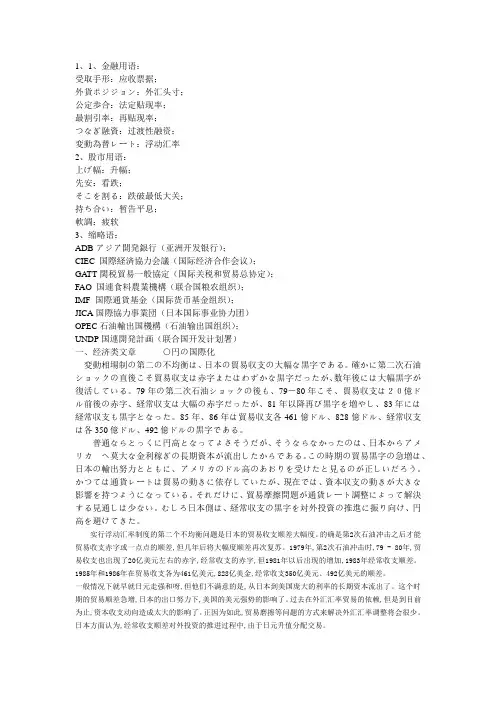
1、1、金融用语:受取手形:应收票据;外貨ポジジョン:外汇头寸;公定歩合:法定贴现率;最割引率:再贴现率;つなぎ融資:过渡性融资;変動為替レート:浮动汇率2、股市用语:上げ幅:升幅;先安:看跌;そこを割る:跌破最低大关;持ち合い:暂告平息;軟調:疲软3、缩略语:ADBゕジゕ開発銀行(亚洲开发银行);CIEC 国際経済協力会議(国际经济合作会议);GA TT関税貿易一般協定(国际关税和贸易总协定);FAO 国連食料農業機構(联合国粮农组织);IMF 国際通貨基金(国际货币基金组织);JICA国際協力事業団(日本国际事业协力团)OPEC石油輸出国機構(石油输出国组织);UNDP国連開発計画(联合国开发计划署)一、经济类文章○円の国際化変動相場制の第二の不均衡は、日本の貿易収支の大幅な黒字である。
確かに第二次石油ショックの直後こそ貿易収支は赤字またはわずかな黒字だったが、数年後には大幅黒字が復活している。
79年の第二次石油ショックの後も、79-80年こそ、貿易収支は20億ドル前後の赤字、経常収支は大幅の赤字だったが、81年以降再び黒字を増やし、83年には経常収支も黒字となった。
85年、86年は貿易収支各461億ドル、828億ドル、経常収支は各350億ドル、492億ドルの黒字である。
普通ならとっくに円高となってよさそうだが、そうならなかったのは、日本からゕメリカへ莫大な金利稼ぎの長期資本が流出したからである。
この時期の貿易黒字の急増は、日本の輸出努力とともに、ゕメリカのドル高のあおりを受けたと見るのが正しいだろう。
かつては通貨レートは貿易の動きに依存していたが、現在では、資本収支の動きが大きな影響を持つようになっている。
それだけに、貿易摩擦問題が通貨レート調整によって解決する見通しは少ない。
むしろ日本側は、経常収支の黒字を対外投資の推進に振り向け、円高を避けてきた。
实行浮动汇率制度的第二个不均衡问题是日本的贸易收支顺差大幅度。
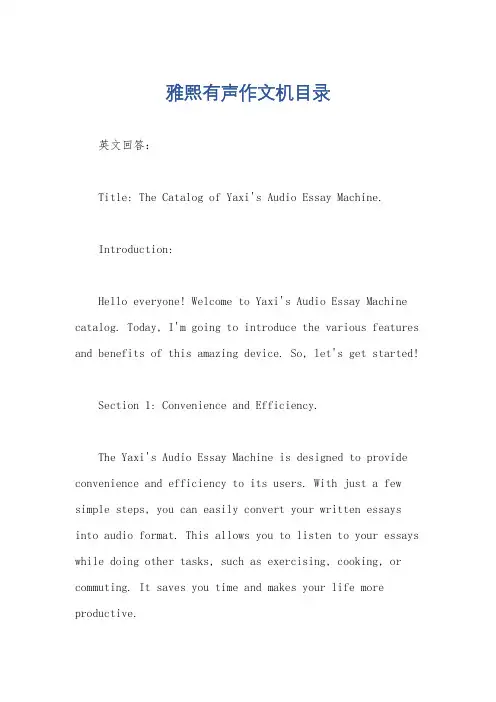
雅熙有声作文机目录英文回答:Title: The Catalog of Yaxi's Audio Essay Machine.Introduction:Hello everyone! Welcome to Yaxi's Audio Essay Machine catalog. Today, I'm going to introduce the various features and benefits of this amazing device. So, let's get started!Section 1: Convenience and Efficiency.The Yaxi's Audio Essay Machine is designed to provide convenience and efficiency to its users. With just a few simple steps, you can easily convert your written essays into audio format. This allows you to listen to your essays while doing other tasks, such as exercising, cooking, or commuting. It saves you time and makes your life more productive.Section 2: High-Quality Audio Output.One of the key features of the Yaxi's Audio Essay Machine is its high-quality audio output. The device uses advanced sound technology to ensure clear and crisp audio playback. It enhances the listening experience and makes your essays more enjoyable to listen to.Section 3: Multilingual Support.The Yaxi's Audio Essay Machine offers multilingual support, which means you can convert your essays into different languages. Whether you are learning a new language or need to communicate with people from different cultural backgrounds, this feature is incredibly useful. It helps you improve your language skills and broaden your horizons.Section 4: Customization Options.To make your audio essays more personalized, the Yaxi'sAudio Essay Machine provides customization options. You can choose different voices, accents, and even background music to accompany your essays. This adds a touch of creativity and uniqueness to your audio essays.Section 5: User-Friendly Interface.The Yaxi's Audio Essay Machine has a user-friendly interface that is easy to navigate. Even if you are nottech-savvy, you can quickly learn how to operate the device. The clear instructions and intuitive design make it accessible to users of all ages and backgrounds.Conclusion:In conclusion, the Yaxi's Audio Essay Machine is a revolutionary device that brings convenience, efficiency, and creativity to the world of essay writing. Its high-quality audio output, multilingual support, customization options, and user-friendly interface make it a must-havetool for students, professionals, and anyone who wants to enhance their essay writing experience.中文回答:标题,雅熙有声作文机目录。
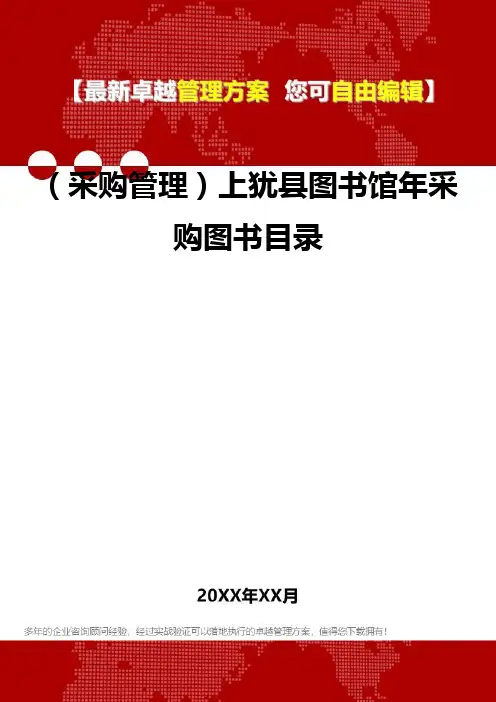
(采购管理)上犹县图书馆年采购图书目录豹狼情仇出版社:云南教育出版社¥10.00火箭总指挥.黄春平出版社:江苏少年儿童出版社¥10.00超时空流浪者/校园三剑客出版社:江苏少年儿童出版社¥14.00编辑心语出版社:河北教育出版社¥69.00经典童话I:木偶奇遇记(注音版)出版社:中国民航出版社¥5.20经典童话I:美女与怪兽(注音版)出版社:中国民航出版社¥5.20经典童话I:糖果屋(注音版)出版社:中国民航出版社¥5.20经典童话I:伊万与大灰狼(注音版))出版社:中国民航出版社¥5.20 经典童话I:小红帽(注音版)出版社:中国民航出版社¥5.20土地在呼唤:保护人类赖以生存的耕地出版社:广西科学技术出版社¥19.00文学编辑四十年出版社:人民文学出版社¥25.00蓝调江南出版社:古吴轩出版社¥15.00世界五千年(全三册)出版社:格致出版社¥55.00力力不喜欢女孩出版社:江苏少年儿童出版社¥13.80晚上的浩浩荡荡童话出版社:江苏少年儿童出版社¥13.80李毓佩数学故事系列:数学西游记(珍藏版)出版社:湖北少儿出版社¥10.80木乃伊同学出版社:福建少年儿童出版社¥15.00刀疤豺母出版社:花山文艺出版社¥10.00天王猫出版社:接力出版社¥16.00动物情感故事系列(亲情篇)--雌孔雀的恋情出版社:湖北少儿出版社¥12.00化学迷宫:化学篇——不知道的世界出版社:中国少年儿童出版社¥9.00文坛歧义:文学篇——不知道的世界出版社:中国少年儿童出版社¥9.00古生究竟:古生物篇——不知道的世界出版社:中国少年儿童出版社¥9.00鸟兽寻踪:鸟兽篇——不知道的世界出版社:中国少年儿童出版社¥9.00冷血秘案:鱼、爬行、无脊椎动物篇——不知道的世界出版社:中国少年儿童出版社¥9.00 大洋探幽:海洋篇——不知道的世界出版社:中国少年儿童出版社¥9.00南极探秘出版社:江苏少年儿童出版社¥8.50糖果屋彩色世界经典童话寓言宝库(注音版)出版社:民族出版社¥26.80白雪公主彩色世界经典童话寓言宝库(注音版)出版社:民族出版社¥26.80老狼与小羊彩色世界经典童话寓言宝库(注音版) 出版社:民族出版社¥26.80阿拉丁与神灯彩色世界经典童话寓言宝库(注音版)出版社:民族出版社¥26.80丑小鸭彩色世界经典童话寓言宝库(注音版)出版社:民族出版社¥26.80灰姑娘彩色世界经典童话寓言宝库(注音版)出版社:民族出版社¥26.80小人国彩色世界经典童话寓言宝库(注音版)出版社:民族出版社¥26.80小锡兵彩色世界经典童话寓言宝库(注音版)出版社:民族出版社¥26.80感恩生活出版社:北京少年儿童出版社¥13.00家有小丑宝贝当家(中篇小说卷) 出版社:安徽少年儿童出版社¥13.00超常儿童发展心理学出版社:安徽教育出版社¥28.00少年班三十年出版社:中国科学技术大学出版社¥58.00让孩子成功地学习出版社:西南师范大学出版社¥18.00天才咨商出版社:安徽人民出版社¥9.00影响孩子一生的10大教育方法出版社:内蒙古科学技术出版社¥25.80天赋教育:超常儿童的发现与培养出版社:中国人口出版社¥19.80早期诱发:帮你迅速提高孩子学习成绩出版社:中国妇女出版社¥19.80杰出中学生的十四种能力出版社:中国对外翻译出版社¥14.80杰出中小学生的成长奥秘出版社:中国对外翻译出版社¥16.80合计:847.3元总计:210512.49元中国特殊教育学基础/华夏英才基金学术文库出版社:教育科学出版社¥23.00铃木镇教育法出版社:石油工业出版社¥23.80涛头弄潮第1班出版社:龙门书局¥18.00眼睛——透视中国神童出版社:中国城市出版社¥22.80发现天才儿童出版社:中国世界语出版社¥25.00谋略大师出版社:¥29.50“六十四卦”中的人生哲理与谋略--易经对话录(最新修订版) 出版社:社会科学文献出版社¥35.00 20部必读的谋略经典——大师经典·读书计划出版社:北京工业大学出版社¥22.80谋略思维出版社:上海科学技术文献出版社¥20.00谋略经纬出版社:武汉大学出版社¥20.00人生谋略与大智慧——野蛮生长诡道智慧出版社:¥29.60谋略与战略:管理文化的观点出版社:科学出版社¥45.00中华文化与智慧谋略出版社:华文出版社¥39.80合计:354.3元总计:213342.49元大头儿子和小头爸爸拼音版玩具医院出版社:少年儿童出版社¥10.00咬人的夏天出版社:中国福利会出版社¥15.00中国幽默儿童文学创作丛书:笨狼旅行记出版社:浙江少年儿童出版社¥11.00蟋蟀出版社:湖北少儿出版社¥14.80一双鞋能走多远出版社:湖南少儿出版社¥15.00傻瓜相机出版社:文汇出版社¥20.00道器之间——艺术与设计论札出版社:安徽教育出版社¥58.00我的经历你的故事出版社:少年儿童出版社¥13.00李毓佩数学学习故事.小学中年级出版社:海豚出版社¥16.00非常小子马鸣加:发明大王马鸣加出版社:少年儿童出版社¥10.00非常小子马鸣加:大力士马鸣加出版社:少年儿童出版社¥10.00乡野童话——中国当代儿童散文诗精品丛书出版社:湖南少儿出版社¥12.00男生贾里——百年百部中国儿童文学经典书系出版社:湖北少儿出版社¥17.80大头儿子和小头爸爸拼音版打不开的门出版社:少年儿童出版社¥10.00男生贾里全传:挚爱版出版社:少年儿童出版社¥29.00当代儿童文学名家作品精选——成长的书香(2)出版社:黑龙江科学技术出版社¥20.00 穷女孩心香和富女孩可人——看看丛书·情感小说出版社:中国福利会出版社¥15.00小香咕新传:不好惹的蜜蜂老师出版社:¥10.00当代儿童文学名家作品精选——成长的书香(3)出版社:黑龙江科学技术出版社¥20.00小香咕新传:妞儿小当家出版社:¥10.00小香咕新传:魔鬼老哥的邀请出版社:¥10.00淘淘丛书小丫林晓梅(美绘本)出版社:少年儿童出版社¥24.00小狼灰灰(注音版)——“我真棒”幼儿成长图画书出版社:江苏少年儿童出版社¥6.00洪思经典小国学3:千字文(1书+1DVD)出版社:吉林文史出版社¥19.80大头儿子和小头爸爸拼音版斑点狗过生日出版社:少年儿童出版社¥10.00秦文君花香文集:栀子卷出版社:接力出版社¥21.00新世纪三字经(注音版)出版社:中国矿业大学出版社发行科¥5.80校园三剑客④:银河铁道之夜出版社:希望出版社¥12.00青少年心理健康教育与心理咨询——21世纪科学教育书系出版社:科学普及出版社¥23.50一块怪石头(注音版)——讲给中国孩子听的益智童话出版社:同心出版社¥24.80调皮的日子(全本) 出版社:文汇出版社¥28.00广东十大民间工艺<<广州牙雕>>* 出版社:岭南美术出版社¥39.00大头儿子和小头爸爸拼音版烦恼的高兴事出版社:少年儿童出版社¥10.00西游记(注音版)——中国古典名著启蒙丛书出版社:北方妇女儿童出版社¥12.80爱的教育/影响孩子一生的世界十大名著(少儿注音彩图版) 出版社:北京少年儿童出版社¥17.80 小偷寄来诅咒信/笠笠非常图本小说出版社:江苏少年儿童出版社¥13.00航空博览——绘图新世纪少年工程师丛书出版社:广西科学技术出版社¥25.50老象恩仇记——激情动物档案出版社:少年儿童出版社¥12.00望远镜丛书(共八册)出版社:海燕出版社¥85.00黄叶儿跳舞(注音版)——“我真棒”幼儿成长图画书出版社:江苏少年儿童出版社¥6.00大头儿子和小头爸爸拼音版斑点狗过生日出版社:少年儿童出版社¥10.00安妮是男孩就好了/笠笠非常图本小说出版社:江苏少年儿童出版社¥12.00坏表哥找上门出版社:江苏少年儿童出版社¥12.00李毓佩数学故事系列:数学西游记出版社:湖北少儿出版社¥10.80大狗喀啦克拉的公寓(中英文版)出版社:中国少年儿童出版社¥19.00合计:806.4元总计:214148.89元。
沐沐托福 m u m u t u o f u .t a o b a o .c o m Life have so many choices, which one do you prefer? get one, get success in the exam!如果你想要不一样的作文口语答案,甚至是双份的独家口语1-6题综合口语写作全套答案,来结合康老师或是竹子机经使用的话(此答案包含WORD 可修改版本噢): /item.htm?id=150******** 如果你在苦恼每次考试考完以后都不知道最新的动态,想避免浪费时间在已经考掉的题目上,或是想听竹子老师亲自的最新录音分析,请拍沐沐独家追踪跟新的竹子机经: /item.htm?id=10780198054 如果你在苦恼即便中了机经,你的阅读听力还是答不好,因为只知道大概内容,不知道原文原题,考试依旧答不上,需要原文原题拍康老师机经,第十一期康老师机经针对5月份的从台湾直邮限购噢!: /item.htm?id=131******** 如果你怕雷同,又怕中了机经却不能最好的发挥作文答案的优势,想定制独家的托福作文?只为你一个人而写?你命名,我来写! 沐沐托福独立写作代写: /item.htm?id=9681623818 如果您想从实力出发,全真地模拟和了解托福考试流程,训练自己考场能力,包括MAC 电脑上可用的版本,请拍沐沐家TPO 。
试用版本(MAC 系统)在附件里~ TPO1-24(以后还有考试适用!) /item.htm?id=15423088192 TPO17-24(最后几天冲刺适用!!): /item.htm?id=15423120118如果你神马都不想拍,觉得一份就已经足够,沐沐依旧送上自己的祝福:愿大家早日飞跃重洋,到达理想的彼岸! Bless~!MUA~沐沐托福 m u m u t u o f u .t a o b a o .c o m2013年留学季,文书代写火热进行ING 。
2011年托福口语机经更多托福资料下载请点击:2011口语机经2011年08月28日大陆托福机经1 describe a type of music that you would not like listening to. 还是举个例子或者阐述理由之类的。
2 好像是说有些学生喜欢聚在一起做事情,比如做作业讨论什么的,但是有些人喜欢自己做这些事。
问你更倾向于哪一个,还是要理由的。
2011年08月27日大陆托福机经重复2010年06月26日北美口语 1 Describe a good study habit that is different from other students口语2 对Teenage 来说play computer or video games is a waste of time2011年08月27日北美托福机经1:是学校用break的时间组织学生进行某项activity,你会选择什么activity。
2:你同不同意,人们未来会比现在读更少的书?原题是Do you think poeple will read less books than today?2011年08月21日大陆托福机经重复2009年11月07日北美1. Descripte a thing that you always wanted to do but have not yet done it. Detail and explanations.2. 实在想不起来2011年08月20日北美托福机经1. 选择你学习过的2所学校,描述他们的不同。
2. 现代电子产品上市,你是喜欢已上市就买,还是喜欢过一段时间再买2011年08月13日大陆托福机经重复2010年07月23日北美1. 我们现在社会面临着很严重的环境问题,选取一个你认为有用的方法来save our planet。
2. 你是愿意carefully choose the gift which your friends like or choose whatever you like?比如说money。
Using Probabilistic Knowledge and Simulation to Play Poker Darse Billings, Lourdes Peña, Jonathan Schaeffer, Duane SzafronDepartment of Computing Science, University of AlbertaEdmonton, Alberta Canada T6G 2H1{darse, pena, jonathan, duane}@cs.ualberta.caAbstractUntil recently, artificial intelligence researchers who use games as their experimental testbed have concentrated on games of perfect information. Many of these games have been amenable to brute-force search techniques. In contrast, games of imperfect information, such as bridge and poker, contain hidden information making similar search techniques impractical. This paper describes recent progress in developing a high-performance poker-playing program. The advances come in two forms. First, we introduce a new betting strategy that returns a probabilistic betting decision, a probability triple, that gives the likelihood of a fold, call or raise occurring in a given situation. This component unifies all the expert knowledge used in the program, does a better job of representing the type of decision making needed to play strong poker, and improves the way information is propagated throughout the program. Second, real-time simulations are used to compute the expected values of betting decisions. The program generates an instance of the missing data, subject to any constraints that have been learned, and then simulates the rest of the game to determine a numerical result. By repeating this a sufficient number of times, a statistically meaningful sample is used in the program’s decision–making process. Experimental results show that these enhancements each represent major advances in the strength of computer poker programs.1. IntroductionPast research efforts in computer game-playing have concentrated on building high-performance chess programs. With the Deep Blue victory over World Chess Champion Garry Kasparov, a milestone has been achieved but, more importantly, the artificial intelligence community has been liberated from the chess “problem”. The consequence is that in recent years a number of interesting games have attracted the attention of AI researchers, where the research results promise a wider range of applicability than has been seen for chess. Computer success has been achieved in deterministic perfect information games, like chess, checkers and Othello, largely due to so-called brute-force search. The correlation of search speed to program performance gave an easy recipe to program success: build a faster search engine. The Deep Blue team took this to an extreme, analyzing roughly 250 million chess positions per second. In contrast, until recently imperfect information games have attracted little attention in the literature. In these games, no player knows the complete state and each player has to infer the missing information to maximize the chances of success. For these games, brute-force Copyright © 1999. American Association for Artificial Intelligence {}. All rights reserved.search is not successful since it is often impractical to search the game trees that result from all possible instances of the missing information.Two examples of imperfect information games are bridge and poker. Recently, at least two research groups have made an effort to achieve high-performance bridge-playing programs [Ginsberg, 1999; Smith et al., 1998]. The progress has been impressive, and we may not have to wait long for a world-championship caliber program. Until now, the computing community has largely ignored poker (a recent exception being [Koller and Pfeffer, 1997]). However, poker has several attributes that make it an interesting and challenging domain for mainstream AI research [Billings et. al., 1998a].We are attempting to build a program that is capable of beating the best human poker players. We have chosen to study the game of Texas Hold’em, the poker variation used to determine the world champion in the annual World Series of Poker. Hold’em is considered the most strategically complex poker variant that is widely played. Our program, Loki, is a reasonably strong player (as judged by its success playing on the Internet) [Billings et. al., 1998a; 1998b]. The current limitation in the program’s play is its betting strategy - deciding when to fold, call/check, or raise/bet. A betting strategy attempts to determine which betting action will maximize the expected winnings (or minimize the losses) for a hand. The previous version of Loki used several expert-knowledge evaluation functions to make betting decisions. These routines were rigid in the sense that they always returned a single value: the “best” betting decision. Although these evaluation functions allowed Loki to play better than average poker, it was inadequate to play at a world-class level, since continually upgrading this knowledge is difficult and error-prone.This paper introduces two major advances in the capabilities of computer-poker-playing programs. Each is shown experimentally to result in substantial improvements in Loki’s play.First, this paper introduces a new betting strategy that returns a probability triple as the knowledge representation of the evaluation function. The routine returns three probabilities (one each for fold, call/check, and raise/bet). The program can then randomly select the betting decision in accordance with the probability triples. Representing decisions as a probability distribution better captures the type of information needed to perform well in a noisy environment, where randomized strategies and misinformation are important aspects of strong play. Thiscomponent also allows us to unify the expert knowledge in a poker program, since the same component can be used for betting decisions, opponent modeling, and interpreting opponent actions.Second, Loki now bases its betting strategy on a simulation-based approach; we call it selective sampling. It simulates the outcome of each hand, by generating opponent hands from the sample space of all appropriate possibilities, trying each betting alternative (call/check, bet/raise) to find the one that produces the highest expected winnings. A good definition of appropriate hands is one of the key concepts in defining selective sampling and it is one of the main topics of this paper. As with brute-force search in chess, the simulation (search) implicitly uncovers information that improves the quality of a decision. With selective sampling, the knowledge applied to a simulation quantifies the value of each choice, improving the chance of making a good decision. Simulation-based approaches have been used in other games, such as backgammon [Tesauro, 1995], bridge [Ginsberg, 1999], and Scrabble1 [Sheppard, 1998]. The simulation methods presented in this paper are quite similar to those used by Ginsberg in Gib, although there are several distinctions in the details, due to differences in the games.For deterministic perfect information games, there is a well-known framework for constructing these applications (based on the alpha-beta algorithm). For games with imperfect information, no such framework exists. For handling this broader scope of games we propose that selective sampling simulation be such a framework.2. Texas Hold’emA hand of Texas Hold’em begins with the pre-flop, where each player is dealt two hole cards face down, followed by the first round of betting. Three community cards are then dealt face up on the table, called the flop, and the second round of betting occurs. On the turn, a fourth community card is dealt face up and another round of betting ensues. Finally, on the river, a fifth community card is dealt face up and the final round of betting occurs. All players still in the game turn over their two hidden cards for the showdown. The best five card poker hand formed from the two hole cards and the five community cards wins the pot. If a tie occurs, the pot is split. Typically, Texas Hold’em is played with 8 to 10 players. Limit Texas Hold’em has a structured betting system, where the order and amount of betting is strictly controlled in each betting round.2 There are two denominations of bets, called the small bet and the big bet ($10 and $20 in this paper). In the first two betting rounds, all bets and raises are $10, while in the last two rounds they are $20. In general, when it is a player’s turn1 ™ Milton-Bradley company.2 In No-limit Texas Hold'em, there are no restrictions on the size of bets.to act, one of three betting options is available: fold, call/check, or raise/bet. There is normally a maximum of three raises allowed per betting round. The betting option rotates clockwise until each player has matched the current bet or folded. If there is only one player remaining (all others having folded) that player is the winner and is awarded the pot without having to reveal their cards.3. Building a Poker ProgramA minimal set of requirements for a strong poker-playing program includes assessing hand strength and potential, betting strategy, bluffing, unpredictability and opponent modeling. Descriptions of these as they are implemented in our program, Loki, can be found in [Billings et. al., 1998a; 1998b]. There are several other identifiable characteristics that may not be necessary to play reasonably strong poker, but may eventually be required for world-class play.The architecture of the previous version of Loki, which we now call Loki-1, is shown in Figure 1. In the diagram, rectangles are major components, rounded rectangles are major data structures, and ovals are actions. The data follows the arrows between components. An annotated arrow indicates how many times data moves between the components for each of our betting actions.To make a betting decision, the Bettor calls the Hand Evaluator to obtain an assessment of the strength of the current cards. The Bettor uses this hand strength, the public game state data and expert-defined betting knowledge to generate an action (bet, call or raise). To evaluate a hand, the Hand Evaluator enumerates over all possible opponent hands and counts how many of them would win, lose or tie the given hand. After the flop, the probability for each possible opponent hand is different. For example, the probability that hole cards of Ace-Ace are held after the flop is much higher than 7-2, since most players will fold 7-2. Each possible hand has a weight in the Weight Table for each opponent, and these weights are modified after each opponent action. Updating the probabilities for all hands is a process called re-weighting. After each opponent action, the Opponent Modeler calls the Hand Evaluator once for each possible hand and increases or decreases the weight for that case to be consistent with the new information. The Hand Evaluator uses the Weight Table values to bias the calculation, giving greater weight to the more likely hands. The absolute values of the probabilities are of little consequence, since only the relative weights affect the later calculations.Loki-1 uses expert knowledge in four places:1. Pre-computed tables of expected income rates areused to evaluate its hand before the pre-flop, and to assign initial weight probabilities for the various possible opponent hands.2. The Opponent Modeler applies re-weighting rules tomodify the opponent hand weights based on the previous weights, new cards on the board, opponent betting actions, and other contextual information.3. The Hand Evaluator uses enumeration techniques tocompute hand strength and hand potential for any hand based on the game state and the opponent model.4. The Bettor uses a set of expert-defined rules and ahand assessment provided by the Hand Evaluator for each betting decision: fold, call/check or raise/bet.This design has several limitations. First, expert knowledge appears in various places in the program, making Loki difficult to maintain and improve. Second, the Bettor returns a single value (fold, call, raise), which does not reflect the probabilistic nature of betting decisions. Finally, the opponent modeler does not distinguish between the different actions that an opponent might take. A call/check versus a bet/raise gives valuable information about the opponent’s cards. These issues led to a redesign of how knowledge is used in Loki.The new version of Loki, called Loki-2 makes two fundamental changes to the architecture. First, it introduces a useful, new data object called a probability triple that is used throughout the program (Section 4). Second, simulation with selective sampling is used to refine the betting strategy (Section 5). Loki-2 can be used with or without simulation, as shown in Figure 2. With simulation, the Simulator component replaces the simpler Action Selector.4. Probability TriplesA probability triple is an ordered triple of values, PT = [f,c,r], such that f + c + r = 1.0, representing the probability distribution that the next betting action in a given context is a fold, call, or raise, respectively. Probability triples are used in three places in Loki-2. The Action Selector uses a probability triple to decide on a course of action (fold, call, raise). The Opponent Modeler uses an array of probability triples to update the opponent weight tables. The Simulator (see Section 5) uses probability triples to choose actions for simulated opponent hands.Each time it is Loki-2’s turn to bet, the Action Selector uses a single probability triple to decide what action to take (note that the Bettor is gone). For example, if the triple [0.0,0.8,0.2] is given, then the Action Selector would call 80% of the time, raise 20% of the time, and never fold. The choice can be made by generating a random number, allowing the program to vary its play, even in identical situations. This is analagous to a mixed strategy in game theory, but the probablility triple implicitly contains contextual information resulting in better informed decisions which, on average, can out-perform a game theoretic approach.The Triple Generator is responsible for generating probability triples. As shown in Figure 2, this routine is now at the heart of Loki-2. The Triple Generator takes a two-card hand and calls the Hand Evaluator to evaluate the cards in the current context. It uses the resulting hand value, the current game state, and expert-defined betting rules to compute the triple. Note that in addition to using the Triple Generator to produce a triple for our known hand, it can also be used to assess the likely behavior of the opponent holding any possible hand.For the Hand Evaluator to assess a hand, it compares that hand against all possible opponent holdings. To do this, it uses the opponent Weight Table. In Loki-2, the Opponent Modeler now uses probability triples to update this table after each opponent action. To accomplish this, the Triple Generator is called for each possible two-card hand. It then multiplies each weight in the Weight Table by the entry in the probability triple that corresponds to the opponent’s action. For example, suppose the previous weight for Ace-Ace is 0.7 (meaning that if it has been dealt, there is a 70% chance the opponent would have played it in exactly the manner observed so far), and the opponent now calls. If the probability triple for the current context is [0.0, 0.2, 0.8], then the updated weight for this case would be 0.7 x 0.2 = 0.14. The relative likelihood of the opponent holding Ace-Ace has decreased to 14% because there was no raise. The call value of 0.2 reflects the possibility that this particular opponent might deliberately try to mislead us by calling instead of raising. Using a probability distribution allows us to account for uncertainty in our beliefs, which was not handled by the previous architecture. This process of updating the weight table is repeated for each entry.An important advantage of the probability triple representation is that imperfect information is restricted to the Triple Generator and does not affect the rest of the algorithm. This is similar to the way that alpha-beta search restricts knowledge to the evaluation function. The probability triple framework allows the “messy” elements of the program to be amalgamated into one component, which can then be treated as a “black box” by the rest of the system. Thus, aspects like game-specific information, complex expert-defined rule systems, and knowledge of human behavior are all isolated from the engine that uses this input.Figure 2. Using the Triple Generator in Loki-2.The current architecture also suggests future enhancements, such as better methods for opponent modeling. For example, the cards seen at the showdown reveal clues about how that opponent perceived each decision during the hand. These hindsight observations can be used to adaptively measure important characteristics like aggressiveness, predictability, affinity for draws, and so forth. The Opponent Modeler can maintain each of these properties for use by the Triple Generator, which combines the information in proper balance with all the other factors. The knowledge is implicitly encoded in the probability distribution, and is thereby passed on to all components of the system.Since the more objective aspects of the game could eventually be well defined, the ultimate strength of the program may depend on the success in handling imperfect information, and the more nebulous aspects of the game, such as opponent modeling.5. Simulation-Based Betting Strategy The original Bettor component consisted of expert-defined rules, based on hand strength, hand potential, game conditions, and probabilities. A professional poker player defined the system as a first approximation of the return on investment for each betting decision. As other aspects of Loki improved, this simplistic betting strategy became the limiting factor to the playing strength of the program. Unfortunately, any rule-based system is inherently rigid, and even simple changes were difficult to implement and verify for correctness. A more flexible, computation-based approach was needed.In effect, a knowledge-based betting strategy is equivalent to a static evaluation function. Given the current state of the game, it attempts to determine the action that yields the best result. If we use deterministic perfect information games as a model, the obvious extension is to add search to the evaluation function. While this is easy to achieve in a perfect-information game such as chess (consider all possible moves as deeply as resources permit), the same approach is not feasible for real imperfect information games because there are too many possibilities to consider [Koller and Pfeffer, 1997]. Consider a 10-player game of Texas Hold’em. By the time the flop cards are seen, some players may have folded. Let’s assume one player bets, and it is Loki’s turn to act. The program must choose between folding, calling or raising. Which one is the best decision?1After the program’s decision, every other active player will be faced with a similar choice. In effect, there is a branching factor of 3 possible actions for each player, and there may be several such decisions in each betting round. Further, there are still two betting rounds to come, each of which may involve several players, and one of many (45 or 44) unknown cards. Computing the complete poker decision tree in real time is in general, prohibitively expensive. Since we cannot consider all possible combinations of hands, future cards, and actions, we examine only a representative sample from the possibilities. A larger sample and more informed selection process will increase the probability that we can draw meaningful conclusions.5.1 An Expected Value Based Betting StrategyLoki-2’s new betting strategy consists of playing out many likely scenarios to determine how much money each decision will win or lose. Every time it faces a decision, Loki-2 invokes the Simulator to get an estimate of the expected value (EV) of each betting action (see the dashed box in Figure 2 with the Simulator replacing the Action Selector). A simulation consists of playing out the hand a specified number of times, from the current state of the game through to the end. Folding is considered to have a zero EV, because we do not make any future profit or loss. Each trial is played out twice—once to consider the consequences of a check/call and once to consider a 1 “Best” is subjective. Here we do not consider other plays, such as deliberately misrepresenting the hand to the opponents. The expected value for a whole session is more important than the expected value for a single hand.bet/raise. In each trial the hand is simulated to the end, and the amount of money won or lost is determined. The average over all of the trials is taken as the EV of each action. In the current implementation we simply choose the action with the greatest expectation. If two actions have the same expectation, we opt for the most aggressive one (call over fold and raise over call). Against human opponents, a better strategy might be to randomize the selection of betting actions whose EVs are close in value.Simulation is analogous to a selective expansion of some branches of a game tree. To get a good approximation of the expected value of each betting action, one must have a preference for expanding and evaluating the nodes which are most likely to occur. To obtain a correctly weighted average, all of the possibilities must be considered in proportion to the underlying probability distribution. To select the candidate hands that our opponent may have, we use selective sampling.5.2 Selective SamplingWhen simulating a hand, we have specific information that can be used to bias the selection of cards. For example, a player who has been raising the stakes is more likely to have a strong hand than a player who has just called every bet. For each opponent, Loki maintains a probability distribution over the entire set of possible hands (the Weight Table), and the random generation of each opponent’s hole cards is based on those probabilities. Thus, we are biasing our selection of hole cards for the opponent to the ones that are most likely to occur.At each node in the decision tree, a player must choose between one of three alternatives. Since the choice is strongly correlated to the quality of the cards that they have, we can use the Triple Generator to compute the likelihood that the player will fold, check/call, or bet/raise based on the hand that was generated for that player. The player’s action is then randomly selected, based on the probability distribution defined by this triple, and the simulation proceeds. As shown in Figure 2, the Simulator calls the TripleGenerator to obtain each of our betting actions and each of our opponent actions. Where two actions are equally viable, the resulting EVs should be nearly equal, so there is little consequence if the “wrong”action is chosen.5.3 CommentsIt should be obvious that the simulation approach must be better than the static approach, since it essentially uses a selective search to augment and refine a static evaluation function. Barring a serious misconception (or bad luck on a limited sample size), playing out relevant will improve the default values obtained by heuristics, resulting in a more accurate estimate.As has been seen in other domains, the search itself contains implicit knowledge. A simulation contains inherent information that improves the basic evaluation: hand strength (fraction of trials where our hand is better than the one assigned to the opponent), hand potential (fraction of trials where our hand improves to the best, or is overtaken), and subtle implications not addressed in the simplistic betting strategy (e.g. “implied odds”—extra bets won after a successful draw). It also allows complex strategies to be uncovered without providing additional expert knowledge. For example, simulations can result in the emergence of advanced betting tactics like a check-raise, even if the basic strategy without simulation is incapable of this playAn important feature of the simulation-based framework is the notion of an obvious move cut-off. Although many alpha-beta-based programs incorporate an obvious move feature, the technique is usually ad hoc and the heuristic is the result of programmer experience rather than a sound analytic technique (an exception is the B* proof procedure [Berliner, 1979]). In the simulation-based framework, an obvious move is statistically well-defined. As more samples are taken, if one decision point exceeds the alternatives by a statistically significant margin, one can stop the simulation early and make an action, with full knowledge of the statistical validity of the decision.At the heart of the simulation is an evaluation function. The better the quality of the evaluation function, the better the simulation results will be. One of the interesting results of work on alpha-beta has been that even a simple evaluation function can result in a powerful program. We see a similar situation in poker. The implicit knowledge contained in the search improves the basic evaluation, magnifying the quality of the search. As seen with alpha-beta, there are tradeoffs to be made. A more sophisticated evaluation function can reduce the size of the tree, at the cost of more time spent on each node. In simulation analysis, we can improve the accuracy of each trial, but at the expense of the number of trials performed in real-time. Selective sampling combined with reweighting is similar to the idea of likelihood weighting in stochastic simulation [Fung and Chang, 1989; Shacter and Peot, 1989]. In our case, the goal is different because we need to differentiate between EVs (for call/check, bet/raise) instead of counting events. Also, poker complicates matters by imposing real-time constraints. This forces us to maximize the information gained from a limited number of samples. Further, the problem of handling unlikely events (which is a concern for any sampling-based result) is smoothly handled by our re-weighting system, allowing Loki-2 to dynamically adjust the likelihood of an event based on observed actions. An unlikely event with a big payoff figures naturally into the EV calculations.6. ExperimentsTo obtain meaningful empirical results, it is necessary to conduct a series of experiments under different playing conditions. Each enhancement is tested against a variety of opponents having different styles (e.g. liberal or conservative, aggressive or passive, etc.). Control experiments are run at the same time to isolate the dependent variable. In some cases, experiments are designed with built-in standards for comparison, such asplaying one particular version against the identical program with an enhancement.For each test, the parameters of the experiment (number of deals, length of simulations, etc.) are assigned to produce statistically significant results. For example, 5,000 trials might be used to compare an experimental version against a homogenous field. To test the same feature against a mixed field of opponents might require a parallel control experiment and 25,000 trials to produce stable results, due to the inherently higher variance (noise) of that environment. Many experiments were performed to establish reliable results, and only a cross-section of those tests are presented here. For instance, over 30 experiments were conducted to measure the performance of the new re-weighting system.In this paper, we study the effects of three enhancements, two of which represent improvements to a component of the previous system, and one that is a fundamental change in the way Loki makes its decisions. The features we look at are:R:changing the re-weighting system to use probability triples (Section 4).B:changing from a rule-based Bettor to an Action Selector that uses probability triples and incorporates a randomized action (Section 4).S:incorporating a Simulator to compute an EV estimate, which is used to determine an action (Section 5).It is important to note that the enhancements were not maximized for performance. The probability-triple-based betting strategy and re-weighting were implemented in only a few hours each, owing to the improved architecture. The changes to Loki were first assessed with self-play tournaments. A tournament consisted of playing two versions of Loki against each other: a control version (8 copies) and an enhanced version (2 copies). By restricting the tournament to two different player types, we reduced the statistical variance and achieved meaningful results with fewer hands played. To further reduce variance, tournaments followed the pattern of duplicate bridge tournaments. Each hand was played ten times. Each time the seating arrangement of the players was changed so that 1) every player held every set of hidden cards once, and 2) every player was seated in a different position relative to all the opponents. A tournament consisted of 2,500 different deals (i.e. 25,000 games).The number of trials per simulation was chosen to meet real-time constraints and statistical significance. In our experiments, we performed 500 trials per simulation, since the results obtained after 500 trials were quite stable. The average absolute difference in expected value after 2000 trials was small and seldom resulted in a significant change to an assessment. The difference between 100 trials and 500 trials was much more significant; the variance with 100 trials was too high.The metric used to measure program performance is the average number of small bets won per hand (sb/hand). This is a measure sometimes used by human players. For example, in a game of $10/$20 Hold’em, an improvement of +0.10 sb/hand translates into an extra $30 per hour (based on 30 hands per hour). Anything above +0.05 small bets per hand is considered a large improvement. In play on an Internet poker server, Loki has consistently performed at or above +0.05 sb/hand.Figure 3 shows the results of playing Loki against itself with the B and R enhancements individually and combined (B+R). Against the Loki-1 standard, B won +0.025 ± 0.007 sb/hand, R won +0.023 ± 0.0125 sb/hand and the combined B+R won +0.044 ± 0.024 sb/hand, showing that these two improvements are nearly independent of each other. Figure3 also shows enhancement S by itself and S combined withB and R (B+R+S). Note that each feature is a win by itself and in combination with others. In general, the features are not strictly additive since there is some interdependence. The simulation experiments generally had higher variance than those without simulation. However, all statistically significant results showed an improvement for any version of Loki augmented with selected sampling. These results are harder to accurately quantify, but an increase on the order of at least +0.05 sb/hand is evident. These results may be slightly misleading since each experiment used two similar programs. As has been shown in chess, one has to be careful about interpreting the results of these type of experiments [Berliner et al., 1990]. A second set of experiments was conducted to see how well the new features perform against a mixture of opponents with differing styles (as is typically seen in human play). To vary the field of opponents, we defined several different playing styles to categorize players. Players vary from tight (T) to loose (L), depending on what fraction of hands they play to the flop. A style may range from aggressive (A) to conservative (C), depending on how frequently they bet and raise after the flop.Figure 3. Experimental results of the basic Loki player versus the Loki player with enhancements.。
目录2014年独立口语与独立写作押中情况 (3)独立口语 (4)口语答题思路结构分析和范文 (5)独立写作 (7)写作的题目类型总结和思路解析 (8)拼盘重点 (12)(文中标注黄色着重的为新增题目)独立口语口语答题思路结构分析和范文---侯小翊一、独立口语题的答案内容模式和量化规则在独立口语当中,我们首先考虑独立口语的答题时间长度为45秒,折算出来应该大约是我们讲8句话的时间。
那么这8句话应该如何分布呢?首先,我们肯定要响应题目,对题目当中的问题进行一个表态(1句),此后我们要引出自己所表态度背后的原因,那么这里肯定要再说一句(如and I have two reasons to support my idea。
)接下来就是原因陈述部分了,其实这里也需要精打细算,还剩6句话,比较合理的选择是给出两条理由,其中每条理由给出3句论述。
我们不建议3条理由是因为这让每一点上都只能说两句,这样往往展开不充分,而如果只说一个理由则容易把自己逼进一个观点要展开6句的窘境。
考虑到大部分中国考生普遍在口语表述的多样性上存在很大问题的这个现实,我们担心多数人会容易出现没话可说或是出现机械重复已经说过内容的情况。
那么如果选择两条理由来说,每条理由刚好三句,这三句如何安排呢?比较讨巧的方式是采用我们称之为“理+因+果”的三句式。
也就是先一句话说明道理,随着延伸开原因,再进一步说明结果的模式。
二、思路展开模式考虑到每个话题我们会需要两个理由,考生们需要在平时多做思路拓展训练,学会在每个话题点上用辩证的方式对话题进行双向分析,比如讨论人时可以分析其为人和处事两方面,谈论计划时可以分析短期和长期,讨论价值时可以分析物质和精神等等。
一旦我们形成了针对某一类话题的习惯性思路,在回答时让自己的说话内容丰富有序就不会是难事了。
三、范文1. Decribe a charater in a book, film, poem, explain why you like it. 080223NAThe film character that I like the most is definitely Andy in The Shawshank Redemption. He teaches me the best ways for a man to survive hardships.First, I was very much impressed with the way he handled the interpersonal relationships. He established friendship with the upright ones who helped him a lot against the threats from the evil ones. He was even able to get help from the guards and the warden who were not supposed to be on his side.Plus, he was really smart in everything he did. He understood structural engineering and had smart ways of gathering materials he needed for his escape. That is why he was able to get away without anyone noticing.2. Do you think high school students should take economic classes?I think it is necessary for high school students to study some economics, and there is a couple of reasons to explain why.First of all, high school kids are at the stage of entering adulthood, and so it is already time for them to talk care of themselves, especially in terms of personal finance. High school students would be more able to put their allowances or part-time income to wiser use.In addition, I believe economic knowledge can give students a better chance of finding a good job. I mean we are living in a world where pretty much everybody is involved in business transactions and so no wonder people with economic expertise are making good money.3. 什么东西进步是你觉得你国家在过去20年里最重要的?I believe the development of the internet is no doubt one of the most important steps forward that my country has taken in the past 20 years, because it has made our life much better.First, the internet offers us unbelievable sources of information. Nowadays we can get online at home to know what is going on in practically every corner of the world. And as a student, I could basically find everything I need for my research.Plus, the internet brings us a lot of entertainment. With a simple click with the mouse, we could listen to whatever piece of music or watch any kind of movies we like. Not to mention the excitement we get when we play all these incredible internet games.独立写作写作的题目类型总结和思路解析---刘魁今昔对比类/生活类:解题技巧:通常从education, medical care, environment, competition, technology等几个角度去思考,详见后面题型解析重点题目:1.In the past young people are more depended on their parents in making decision. Today, young people are better able to make decisions in their own lives.Agreea)让步段:single child in the family但是parents’ education about independenceb)Body1: advanced technology导致更加independentc)Body2: the promotion from governments and schools使得更加independent2.The rules in societies today are too strict for young people.a)让步段:现在有些rules束缚年轻人比如韩国的服兵役制度但是大部分rules是beneficialb)Body1:教育rules有利于年轻人成长c)Body2:社会rules避免年轻人犯罪3.In twenty years’ time, p eople will lead a more leisure life.Agreea)学习上更加放松:Online educationb)工作上更加放松:robotsc)诚然也会有很多压力4.In the past, it was easier to identify what type of career or job would lead to a secure and successful future.Agreea)诚然现在也可以鉴定哪些职位会比较好,但是相比过去,过去还是会更容易一些b)首先,过去的职位少,成功之路比较固定c)其次,过去竞争压力小,现在变数太大Should类解题技巧:通常从必要性和重要性两个方面去思考,详见后面解析重点题目:1.The opinions of celebrities, such as famous entertainers and athletes, are more important to younger people than to older people.a)Younger people 缺乏知识和经验,这些人的意见对他们更加有用b)有利于年轻人更加创新更有雄心壮志2.It is important for the government to protect wild animals and wilderness areas for the future generations, A/D?a)诚然,保护野生动物是全地球所有人类的责任,但是政府更应该有责任保护野生动物b)第一,野生动物遭到了严重的捕杀c)第二,有利于可持续发展,为子孙造福3.To achieve successful development of a country, a government should spend more money on young children’s education rather than on universities, A/D?a)Universitiesb)诚然孩子的教育是基础,也很重要但是在中国大学的教育更加重要c)第一,大学教育缺乏投资和关注d)第二,有利于直接为国家培养人才4.People can solve important problems by themselves or with the help of their family members, so there is no need for government to help them.a)Disagree:b)诚然有些问题是可以通过家人和自己解决的但是很多问题不能c)首先,环境或者就业问题d)其次,教育医疗问题媒体类解题技巧:通常从媒体的功能角度去思考,详见后面解析重点题目:1.The purpose of television should be all educative, not entertaining.a)让步段:确实需要有教育意义b)Body1:如果全是教育,那么人们的生活就很无聊单一c)Body2:娱乐的意义在于放松身心2.It is better to relax by watching a movie or reading a book than doing physical exercise.a)让步段:physical exercise有利于身心健康但是会有意外发生b)Body1:watching a movie有利于缓解压力c)Body2:reading a book有利于打发时间3.20 years from now on, students will no use printed books anymore, A/D?a)让步段:printed books的好处b)Body1:printed books的缺点c)Body2:electronic books 会替代printed books4.Movies and television programs should present stories in which good people are rewarded and bad people are punished, A/D?a)Agree:b)诚然现实有时候跟这不相符,但作为媒体还是要传播正能量c)第一,好人有好报有利于提倡更多的人做好事d)第二,坏人有坏报能够降低犯罪率极端词类解题技巧:如果题干有极端词一般来说否定重点题目:1.Most business people are motivated by only the desire for money, A/D?a)让步段:诚然钱是一个目的之一b)Body1:也有可能是为了实现梦想c)Body2:也有可能是为社会造福2.Visiting museums is the best way to learn about the country, A/D?a)让步段:诚然visiting museums也是一种方式b)Body1:但是还有其他方式比如读书c)Body2:还有亲自旅游其他地方3.The best way to increase the quality of education is to increase teachers’ salaries, A/D?a)让步段:诚然提高工资也是一种方式b)Body1:但是这个方法有缺点c)Body2:还有比这更好的方法比如提升设备4.The most important investment for a company is to spend money to improve the work skills of its employees,A/D?Agreea)诚然,提高员工技能是不错的一个方式b)但是这个方式有很多缺点c)因此有更好的投资比如直接提升产品的质量5.Improving schools is the most important factor for the successful development of a country, A/D?a)Disagreeb)诚然,发展学校很重要但是仅仅只是教育方面c)第一,经济更加重要d)第二,农业也更加重要成功/工作类重点题目:1.Those who do not accept others’ criticism cannot succeed, A/D?Agreea)诚然有些批评是恶意的但是大部分批评是好的b)第一,在政治上需要接受批评c)第二,创业也需要接受批评其他1.Getting advice from friends who are older than you is more valuable than getting advice of your own age,A/D?Agree:a)诚然同龄的朋友可以在相同的兴趣爱好上给我建议但是重要问题还需要年长的朋友b)学习上需要c)工作上需要2.As life becomes more complex, it is essential for young people to have the ability to plan and organize, A/D?a)诚然计划赶不上变化但是大部分情况下做计划还是很有必要的b)学习上需要c)工作上需要3.Parents should give school-age children money as a reward for getting a high mark (grade) in school.Disagreea)诚然这样做可以鼓励孩子但是弊大于利b)首先,高分并不意味着表现突出c)其次,容易让孩子以高分为导向4.Teachers should be paid according to how well their students perform, A/D?Agree:a)诚然,持反方意见的人认为不应该这样因为不公平但是没有比这更好的方法了b)第一,老师面对的是学生,本来就应该由学生评价c)第二,能刺激老师,提高教学质量5.The second reading of a book is more interesting than the first reading.拼盘重点(专门应对写作口语乱拼)。
新托福口语机经汇总新托福独立口语分类机经汇总1一、Person1. 好老师的character1. What do you think is ONE of the most important characteristics that a teacher should have?)1. 说一个你敬佩的人的好性格1. 你最崇拜的人是谁?1. An older people you respect1. 描述你的role mode1. 对你影响最深刻的人。
1. Describe the person who have had positive impact on you1. (Important) characteristic of friends;1. 问好朋友什么最重要?loyalty,honest还是humor1. Who would you love talking with? What do you talk about?1. What qualities should a leader have?1. 遇到困难时,找谁寻求建议,你为何value that person’s advice1. 说说作为team member一个重要的quality1. many students do volunteer work, 问what kind of volunteer do you want to be?2. 人是被电视、报纸、广播上的信息影响得多,还是家人朋友得影响多2. Get advice from family and friends/learning through personal e 某perience, which one do you prefer?2. Do you agree or disagree, the most important influences that young adults have are from their families.2. Family can help young adults a lot(大概是这意思),agree or disagree?2. Do you always make friends who have different interests fromyou? Why?2. 你是愿意当leader 还是当follower2. Do you agree or disagree with the statement: artists and musicians are useful nowadays 大概这样.二、Money1. Power and money is the definition of success.2. 你是想把多余的一点点钱马上用掉,还是存2.飞来横财,是用来do practical thing还是用来只do leisure thing.三、Events1. Describe the most important decision that you made in your life.1. 描述一件自己印象深刻的celebration 或者moment1. Describe a social or political event celebrated in yourcountry (culture)1. A popular activity in your country1. 说一个参加过的memorial 活动之类的(有意义难忘的一件事)1.描述一件童年很happy 的event,然后e某plain why it is memorable1. 讲一个难忘的event,跟你家人和朋友在一起的1. The most memorable and important event of you happened in school1. 印象比较深的celebration,为什么important?1. 描述你最enjoy的一天and why1. 你朋友曾经做过让你开心的事的经验1. Describe a recent e某perience。
小马机经5月24日逆天版独立口语更多托福资料加入:托福吧交流群231581158SPEAKING11、★★★★★Choose one of your favorite methods to relax and explain why it is your favorite.Please include specific details in your explanation.2、★★★★★Describe a skill you are good at,for example,painting or a kind of sport,and explain why it is important to you.Please include specific examples and details in your explanation.3、★★★★★A school is planning to organize it students to visit the workplace. Which place do you recommend the students to visit? 1.A science lab 2.A business office 3.A TV studio4、★★★★★Describe the steps,through which you once learned a new subject and explain how you learned it.Please include details and examples in your response.5、★★★★★It is generally agreed that society benefits from the work of its members.Which type of contribution do you think is most valued by your society:that of primary school teachers,artists or nurses?Why?6、★★★★★Your friend has suddenly received a lot of money.What do you think is the best way for your friend to spend this money?Include reasons and details to support your response.7、★★★★★what do you think we should do to decrease the usage of car or other vehicle and solve the traffic problems?8、★★★★★Choose ONE of the forms of the technology in the list and tells why it changes(has had great impact)people's lives in your country?a)The airplane b)The computer c)The Television9、★★★★★Compare the differences between two singers you like.Include specific reasons and details in your explanation.10、★★★★★What do you think is the most significant benefit that internet brings to our life?Explain why you think this benefit is import.Include reasons and details to support your response.11、★★★★★Describe the most important decision you’ve ever made in your life. Explain why it’s important.12、★★★★★What quality is the most important to be a university student:highly motivated,hard working,or intelligence?Using details and examples to support you idea.13、★★★★★Talk about an experience of learning something new.What difficulties do you have to overcome in order to learn it?14、★★★★★Describe a present you have given to others.Explain why you think it is important.15、★★★★★Which of the following do you think is the best way to get to know a new school? 1.Joining a one-day campus tour 2.Spending a weekend on the campus play field 3.Auditing lectures?16、★★★★What time of a year do you like the most?Explain why you like this time of a year.17、★★★★If a high school is planning to organize an after-school activity forits students,what kind of activity would you recommend and why?18、★★★★Which form of transportation is the most enjoyable?Bicycle,automobile, train?19、★★★★Describe a special event or occasion that you have participate with your family or friends.Give Specific details and examples to explain your answer.20、★★★★Talk about an activity you would like to participate in the near future, explain your answer in details.21、★★★★Among the following three activities,which do you think has the most benefits for students? 1.A field trip 2.A home tutoring session 3.A presentation given by a local leader22、★★★★Talk about a time when someone(your friends,family or teachers)gave you advice to solve the problem.23、★★★★Talk about a skill that you have mastered but you still want to improve24、★★★★Which of the following activities do you prefer to do with friends? Taking a walk,going to a movie,traveling to another city.25、★★★★Your friend wants to have a more healthy eating habit.What suggestions would you give to this friend?26、★★★★What is your favorite place to study?Give details and examples in your response.27、★★★★Describe how cellphones change people’s lives.Please give your answer with specific examples and details28、★★★★If a foreign visitor comes to your country,what food will you introduce to him/her?Explain why.29、★★★★Many regions in the world face problems with air pollution.What can be done to decrease the amount of air pollution in these regions?Use details and examples in your response.30、★★★★Describe a person that you look up to as a role model.Explain how this person influenced your life.Include details and examples to support your response.SPEAKING21、★★★★★Some people like to plan their free time.Other people spend their free time without any plan.Which do you prefer.2、★★★★★If you were given an empty pieces of land,would you rather using it to build a garden or a playground for children?3、★★★★★Do you agree or disagree with the statement?Teachers should make their lessons fun.4、★★★★★Some students prefer to go to universities or colleges in their own cities or towns.Others prefer to go to universities or colleges in new cities or towns.Which do you prefer and why?Include details and examples in your explanation.5、★★★★★Some students prefer to work on their course paper one or two days before its due date.Others like to work on the paper bit by bit every day.Which do you prefer and why?6、★★★★★Instead of always being busy,one should have a relaxed life style.Do you agree or disagree with the above statement?Why or why not?Use specific reasons and examples to support your answer.7、★★★★★Some people prefer to live in a place most of their life.Other people prefer to move to different places.Which do you prefer and why?Use specific reasons and examples to support your response.8、★★★★★Which do you think is more important for someone to be successful: taking risks or making safe decisions?9、★★★★★some people prefer to visit only one place during their vacations, others prefer to visit lots of places,which one do you prefer and why?10、★★★★★Do people nowadays lead a healthier lifestyle than people100years ago?11、★★★★★Do you agree or disagree with the statement that it's important for students to study Art and Music in school.Explain your answer in details.12、★★★★★Do you agree or disagree with the statement:artists and musicians are important to our society.13、★★★★★Some people believe that it is better for small children to grow up in a small town.Others,however,believe that it’s better for them to grow up in a big city.Which do you think is better?Do you agree or disagree with the following statement:it is better to be a leader in a group than a supporting member?Use examples anddetails in your explanation.15、★★★★★which one do you prefer,shopping in a large store or shopping in a small store?16、★★★★Some people prefer to do one job or project at one time.Other people prefer to do several jobs or projects at the same time.Which do you prefer and why?17、★★★★Do you agree or disagree with the following statements?Personality changes with e specific reasons to support your answer.18、★★★★Do you agree or disagree with the statement?If you want to be successful in running a business,it is important to have a friendly and outgoing personality.19、★★★★Do you agree or disagree that advertisements have influence on people’s purchasing.20、★★★★Do you prefer to live in an area that is noisy but close to shops or public transportation,or an area that is quiet but far away from shops and public transportation?21、★★★★Do you agree or disagree?The most important influence that young adults have are from their families.22、★★★★Some people consider going to the gym a priority in their life,while others go to the gym only when they have time.Which do you think is better and why?Some people argue that people born with natural abilities are morelikely to succeed.Other people believe success can be achieved through hard work.What's your opinion?24、★★★★Some people think students should study in the classroom while others believe they should visit the museum or the zoo.Which do you prefer and why?25、★★★★Do you agree or disagree with the following statement?The success of a school largely depends on the resources it has such as textbooks and journals.26、★★★★Do you prefer to live in a residence where there are strict rules(such as rules against making loud noises at night),or do you prefer to live in a residence without strict rules.27、★★★★When going on a vacation,some people prefer to stay in a hotel,while others prefer to camp outside in a tent.Which do you prefer?28、★★★★Do you agree or disagree with the following statement?University students should learn how to manage their time more efficiently.29、★★★★Some people prefer to have a very tight schedule,while others prefer to have more free time in their schedule.Which one do you prefer and why?30、★★★★Some students like to learn by themselves,others prefer to share their ideas with others.Which one do you prefer?。